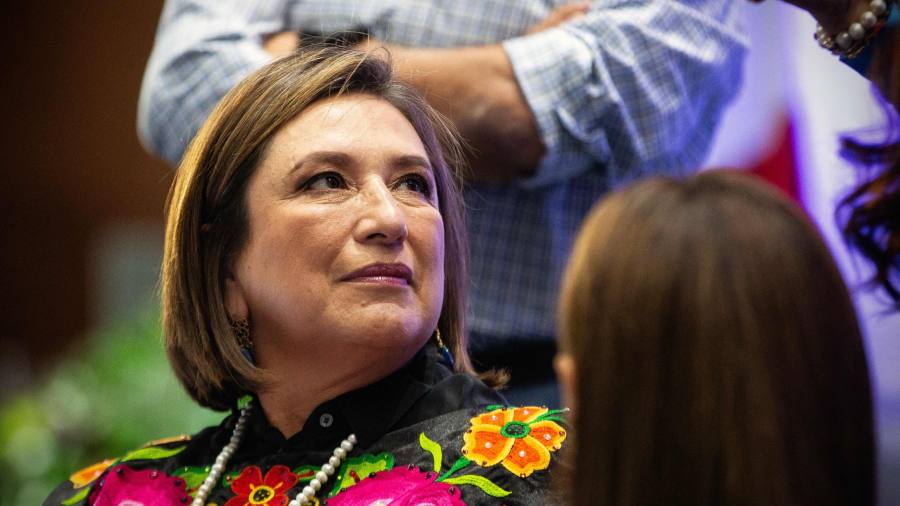
Receive free Mexican politics updates
We’ll send you a myFT Daily Digest email rounding up the latest Mexican politics news every morning.
Mexico’s opposition coalition is set to choose Xóchitl Gálvez, a politician with indigenous roots who escaped rural poverty and founded her own business, to be their presidential candidate in next year’s polls.
Gálvez, of the conservative National Action party (PAN), was the last competitor standing after the Institutional Revolutionary party (PRI) backed her on Wednesday over their own candidate.
Gálvez faces an uphill battle to close the wide lead held by President Andrés Manuel López Obrador’s ruling Morena party in the 2024 vote.
López Obrador, an old-school leftist who has boosted social programs and is behind megaprojects such as an oil refinery and a railway, has held approval ratings of more than 60 per cent during his nearly five years in office.
He is due to step down, and the ruling party candidate is expected to be Claudia Sheinbaum, a former climate scientist and Mexico City mayor. His opponents argue Morena has weakened institutions, scared off investment and allowed drug cartels to strengthen.
In a few months, Gálvez has gone from being a little-known senator to the opposition candidate of choice after a series of headline-grabbing stunts including banging on the door of López Obrador’s morning press conference. Her upbeat, somewhat unpredictable style and humble indigenous origins has differentiated her from the country’s political elite.
Some analysts said her success had alarmed López Obrador, who published what appeared to be her company’s tax records and painted her as a puppet of the oligarchy.
While this has increased her profile, “Gálvez still lacks a credible and appealing narrative and will be surrounded by discredited figures from unpopular parties”, said Eurasia Group analyst Matias Gomez Leautaud, arguing that most voters wanted continuity.
Three of Mexico’s largest opposition parties have joined the Broad Front for Mexico coalition. The PRI’s surprise backing of Gálvez comes ahead of the coalition vote on Sunday. Some have argued this undermines the democratic selection.
“The problem for Xóchitl Gálvez, who has a profile that could grow and build something, is that today she was unveiled in the old-fashioned PRI way,” political analyst Sabino Bastidas said, referring to the PRI’s 70 years of one-party rule that ended in 2000.
Born in poverty in a small town, Gálvez founded and grew a successful smart-buildings company. She later ran the indigenous affairs institute under President Vicente Fox and became a Mexico City district mayor and later a senator.
A recent poll by newspaper Reforma shows that if held today, Gálvez would win just 27 per cent of the vote, compared with Sheinbaum’s 44 per cent.
Morena will choose its candidate next week. With Sheinbaum expected to be chosen, former foreign minister Marcelo Ebrard has complained of unfairness in the process, igniting speculation that he may split from the party.
López Obrador has tried to maintain unity and vowed to win a two-thirds majority in congress to enable the party to push through sweeping changes to everything from the military to the supreme court, though currently polling suggests that is unlikely.
The selection of Gálvez — who has not been embroiled in corruption scandals and is seen as more charismatic than Sheinbaum — may help the opposition improve its showing in congress, Eurasia Group said.
Foreign investment in Mexico is yet to reflect a much-touted boom from so-called nearshoring, in which companies are moving closer to the United States amid tensions with China. But under López Obrador, poverty has fallen and incomes have risen.
Gálvez has to “launch a campaign against the state apparatus and try to create an alternative political offering that is credible and somewhat competitive”, Bastidas said. “Honestly, she’s got a tough job.”